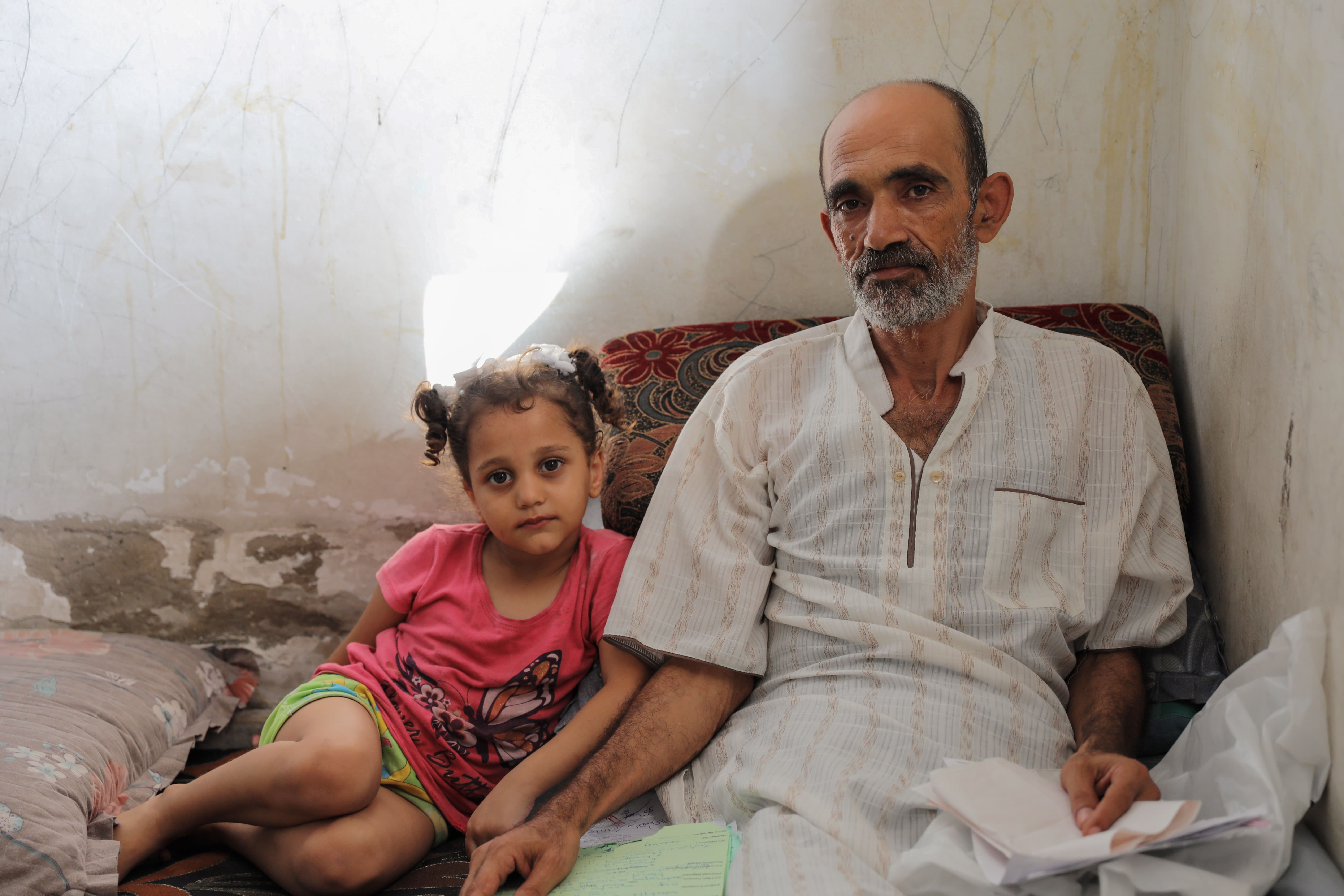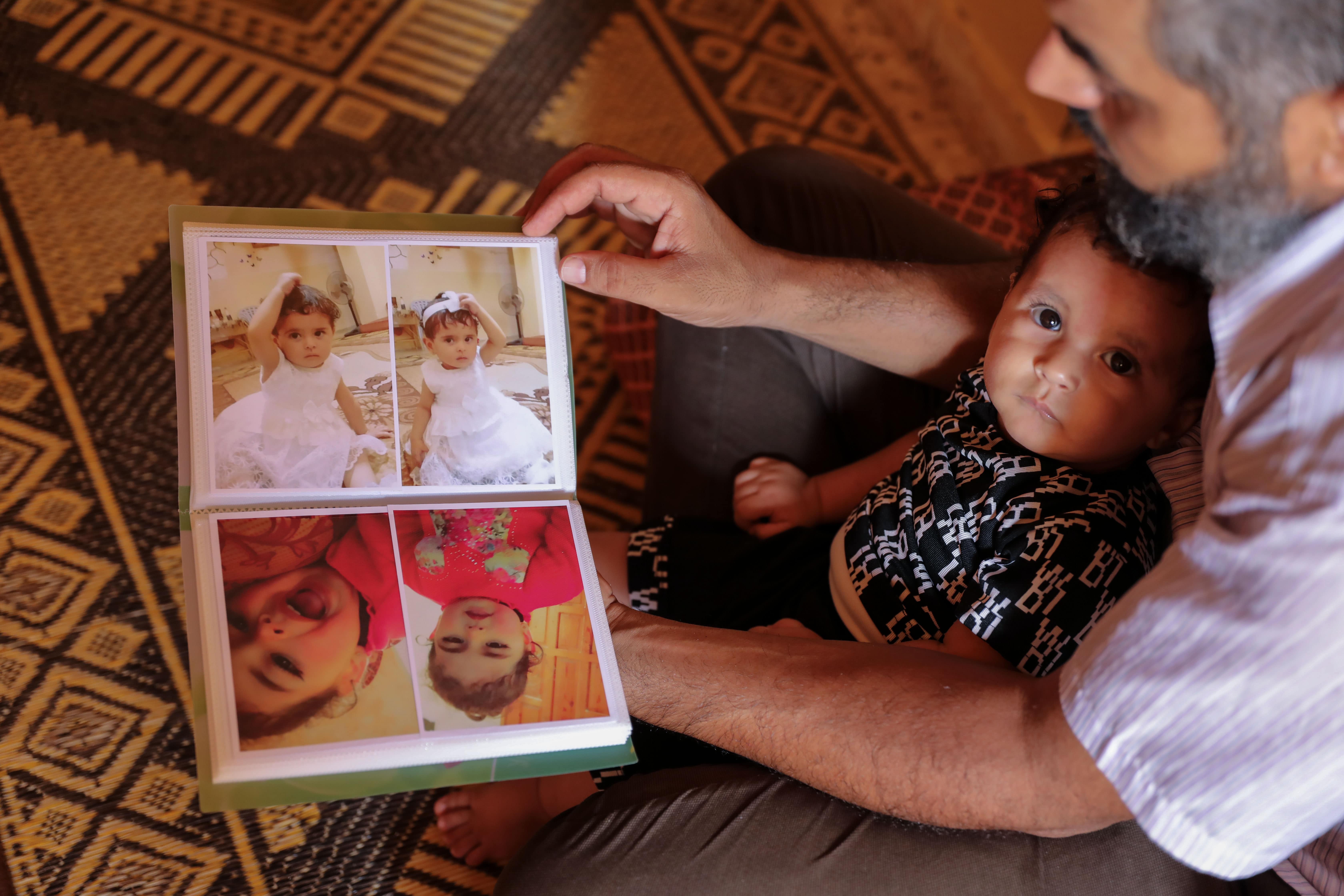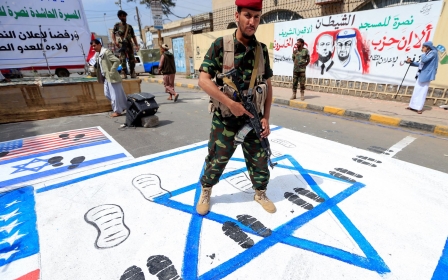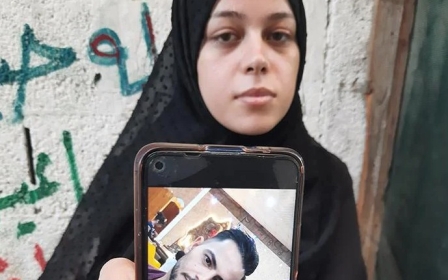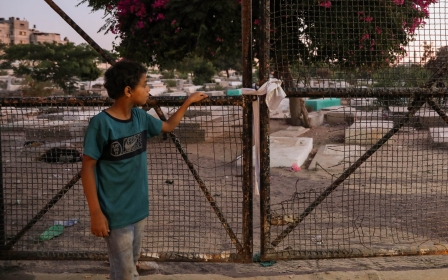Israel: How delayed exit permits kill Palestinian patients in besieged Gaza
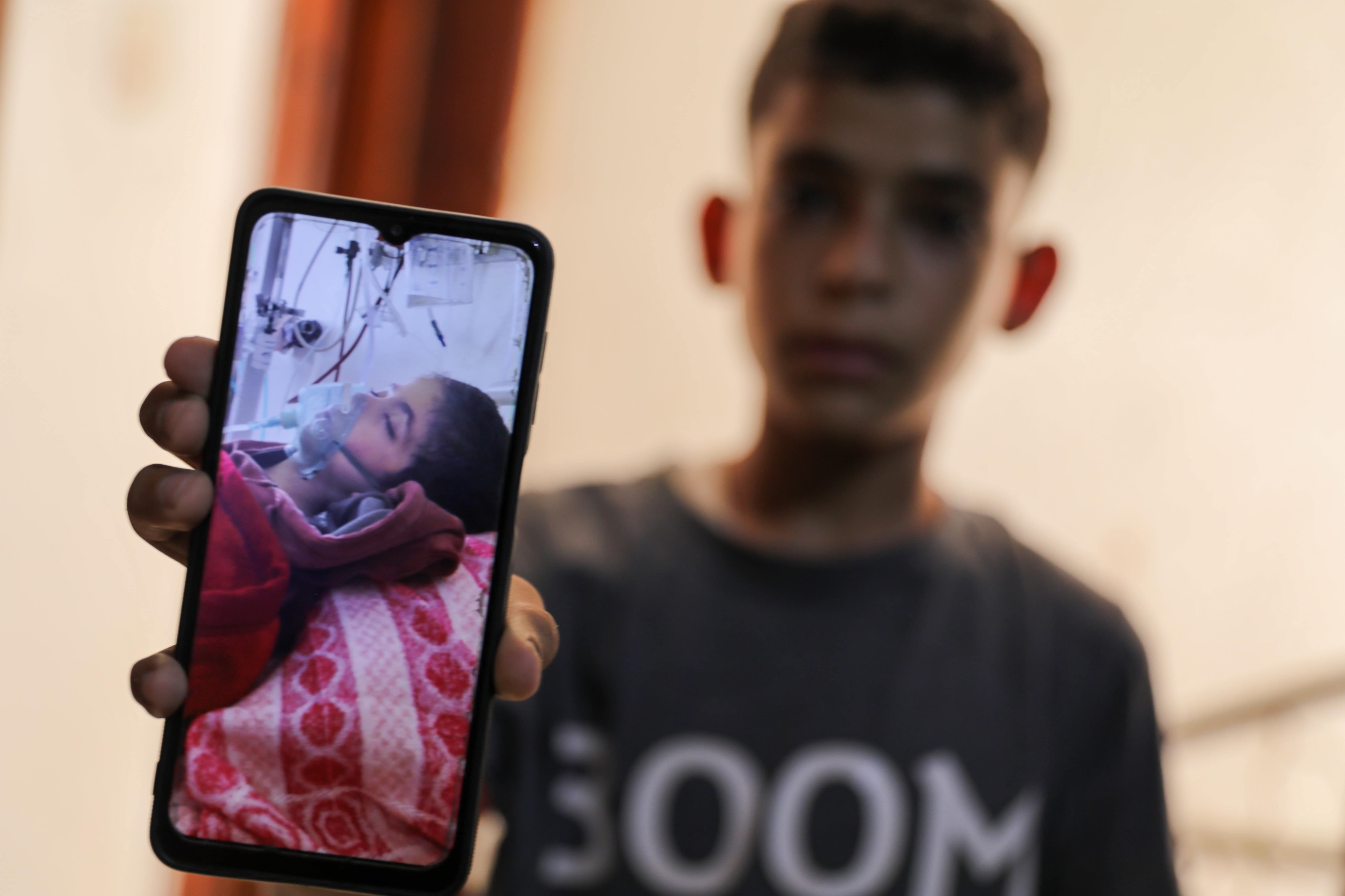
Farouq Abu al-Naja was supposed to attend school for the first time this year, but he died five days before the beginning of the school year, following months of Israeli delays in granting him an exit permit to access urgent medical treatment.
Six-year-old Abu al-Naja, a resident of the Khan Younis area of southern Gaza, died on Wednesday, 24 August, two weeks after his last delayed appointment.
'His health was deteriorating rapidly before my eyes while I was waiting desperately for their approval'
- Mother of Farouq Abu al-Naja
"We submitted two applications [to the Israeli authorities] to transfer Farouq to a hospital in Jerusalem. For eight months, we kept receiving 'request under review' replies," his mother, Kholoud Abu al-Naja, told Middle East Eye.
Abu al-Naja suffered from brain atrophy and was referred by the Palestinian Ministry of Health to Hadassah Hospital in Jerusalem for urgent medical treatment.
After he received financial coverage from the Palestinian Authority (PA), he had only needed a permit from Israel's Gaza Coordination and Liaison Administration (CLA) to allow him to exit Gaza through the Beit Hanoun (Erez) crossing in the east of the Strip.
"His health was deteriorating rapidly before my eyes while I was waiting desperately for their approval," his mother said.
"Seeing him like this, I was totally helpless. He first lost the ability to walk, then to move, then to talk and eat, then he was merely a dead body on a hospital bed. But whenever he opened his eyes, he could recognise me."
Transfer, then permit delay
After his health deteriorated, Abu al-Naja was transferred to the European Hospital in Khan Younis, while his family was completing the "repeated and prolonged procedures" to get the permit.
"The first time, we listed my mother to accompany him, because she is an elderly woman and is therefore more likely to get approval. But we were surprised to receive a text message one day before the appointment saying that her and his applications were pending approval."
In their second and last attempt, Abu al-Naja's family listed the names of his mother and grandmother as companions to increase the chances of getting at least one permit approved, but the applications went unanswered.
"We followed up with the Ministry of Health as well as human rights organisations that communicate with the competent authorities there [in Israel], but in vain," his mother said.
"He died at the hospital before my eyes. I do not know what in the case of a dying six-year-old child needed all this time for review."
Since January, Gaza patients in need of exit permits have been facing even longer delays in receiving responses to their permit applications, as the CLA has refused to respond to legal representatives of Palestinians in Gaza, including human rights organisations and lawyers, according to the Israeli human rights organisation Gisha.
Automated responses
The legal representatives instead receive automated responses from the CLA asking them to refer their requests to the Palestinian Civil Affairs Committee (PCAC), a PA-run body in Gaza that serves as a channel for applications without the capacity to represent the applicants.
"The Israeli authorities' conduct has grave ramifications for Gaza's patients, as they effectively block them from accessing urgent and life-saving medical treatment, putting lives at risk," Gisha's spokesperson, Shai Grunberg, told MEE.
"The irregular, selective nature of the CLA's responses, as well as their prolonged delays in responding to permit applications in general, continue to delay and sometimes effectively deny people's access to medical treatment that isn't available in the Strip," she said.
"Israel's conduct reflects a fundamental failure to acknowledge its legal obligations towards Gaza residents, putting lives and well-being at risk."
According to the World Health Organisation, 1,898 patients from Gaza were referred to health care services in the occupied Palestinian territory in July, of whom 36 percent were delayed access to care, 11 patients were called by Israeli intelligence officers for security interrogation, and 371 were forced to travel without companions.
'Death sentence for Gaza patients'
Kamal al-Shanti, 54, is afraid he will face the same fate as Abu al-Naja, after his third appointment has been delayed.
He suffers from aortic valve stenosis, a progressive disease that restricts the blood flow in the heart and causes severe pain and breathing difficulties.
To avoid him suffering an acute aneurysm rupture, which may lead to death, the Palestinian Ministry of Health urgently referred him to Makassed Hospital in Jerusalem to undergo open-heart surgery.
'All these delayed appointments put extra transportation, hospital, and drug expenses on me'
- Kamal al-Shanti
"I got the first appointment on the 23 June. I requested that my wife, more than 45 years old, and my 26-year-old son to be my companions, but [shortly before the appointment], they said the [request] was still under review," he told MEE.
By July, a feared rupture had developed and worsened. "My doctors told me that my heart was a time bomb that would explode at any moment."
When doctors at Makassed Hospital were told of the deterioration, a second appointment scheduled for mid-August was brought forward to 21 July. But one day before the July hospital visit, Shanti was told that his exit application for that was still under review. The August appointment suffered a similar fate.
"You would laugh if I told you that sometimes when I feel my heart burning late at night and cannot afford to buy painkillers, I buy an ice-pop and place it on my chest to cool down the heat," he said.
"All these delayed appointments put extra transportation, hospital, and drug expenses on me. I have heavy and increasing debts that I am unsure I would ever be able to repay," the retired resident of northern Gaza said.
Shanti is now waiting to hear what will happen to an appointment scheduled for 4 September. Meanwhile, Israeli intelligence have called him for an interview to be held on 5 September.
Exhausted by the delays, Shanti asked his doctors to perform his surgery in Gaza as an alternative, but they said hospitals there do not have the capacity and equipment needed to perform such work.
Hospitals in the Gaza Strip have been facing severe constraints caused by the 15-year blockade, chronic power shortages, and a worsening economic situation.
During Israel's three-day military attack in August, hospitals had less than one month's supply available of 40 percent of essential drugs and 20 percent of medical disposables, according to Medical Aid for Palestine.
'The health crisis, combined with Israel's policy of delayed permits means a "death sentence" for Gaza's patients'
- Gaza health ministry spokesperson Ashraf al-Qedra
Ashraf al-Qedra, spokesperson for the Gaza Ministry of Health, told MEE that the health crisis, combined with Israel's policy of delayed permits means a "death sentence" for Gaza's patients.
"Since the beginning of 2022, four patients, including three children, have died due to Israel's denial of permit requests," he said.
"Dozens of [people with] critical conditions in need of urgent medical treatment outside of Gaza are still waiting for approvals to leave the Strip. Many of them have applied more than two or three times already."
Rescheduled appointments
Five months after her death, Fatma al-Masri's parents still refuse to remove the decoration of her baby shower party that was hung on the ceiling of their living room.
Fatma, who suffered an atrial septal defect (hole in the heart), was born after eight years of marriage, and died aged only 19 months due to persistent Israeli delays in granting her exit permits to get medical treatment.
Her father, Jalal, still appalled by her death, submitted five applications to get his daughter an exit permit. All requests went unanswered.
"I submitted the first permit application at the end of last year and got an appointment on 26 December, but shortly before that date, I received a text message saying that her application was pending under review," he told MEE.
"I went through the same prolonged procedures again to submit another application and got another appointment on 13 February. Three days before the appointment, I received the same message again.
"So I submitted a third application to get another appointment on 6 March, which was delayed until 27 March and then 5 April. Fatma died 11 days before that date."
On the day of her death, Fatma asked her father for chicken wings, but she died while he was on his way to the butcher.
"She was very attached to me, she loved me more than her mother. On that day, she asked me where I was going. I said I was not going to be late and asked her what she wanted for lunch, she said 'I want a wing'.
"Once I left home, my wife called me. She said Fatma wanted to talk to me. For a few minutes while I was on my way, she kept saying Bobba hebbak [broken Arabic for "daddy, I love you"], and singing it repeatedly. I hung up the phone with her, and only few minutes later, my brother called asking me to rush back home."
When they arrived at the hospital, Fatma had already passed away.
"I knew her condition was critical, but I had not expected she would die a few days before her appointment, I had hope that she would get better," the 38-year-old father continued tearfully.
"During the last few weeks before her death, I almost did not sleep at night. She was suffering breathing difficulties and her doctor warned us that she would suffocate at any moment. I used to stay up most of the night watching over her and making sure she was still breathing.
A child is born, then sister dies
"She would sometimes wake up in pain. All I could do was hold her in front of the window to help her get some fresh air and distract her pain."
Fatma's mother had given birth to another child only 40 days before her death. But the family said their new child, Muhammed, could not replace her.
"My mobile is full of photos and videos of Fatma that we took from day one until her death. Whenever she said anything, we would record her, we were crazy about her. But now, if you search my phone, I bet you would find more than two or three photos of Muhammed," Fatma’s mother, Om Muhammed, told MEE.
"She was the first baby we had after eight years of desperate attempts to get pregnant. You could not imagine our joy when she came into our life, we were over the moon. We tried so hard to keep her alive, but thank God for everything, she died anyway."
Ten days after her death, Masri's family received a text message that her application was still "under review."
Middle East Eye propose une couverture et une analyse indépendantes et incomparables du Moyen-Orient, de l’Afrique du Nord et d’autres régions du monde. Pour en savoir plus sur la reprise de ce contenu et les frais qui s’appliquent, veuillez remplir ce formulaire [en anglais]. Pour en savoir plus sur MEE, cliquez ici [en anglais].


